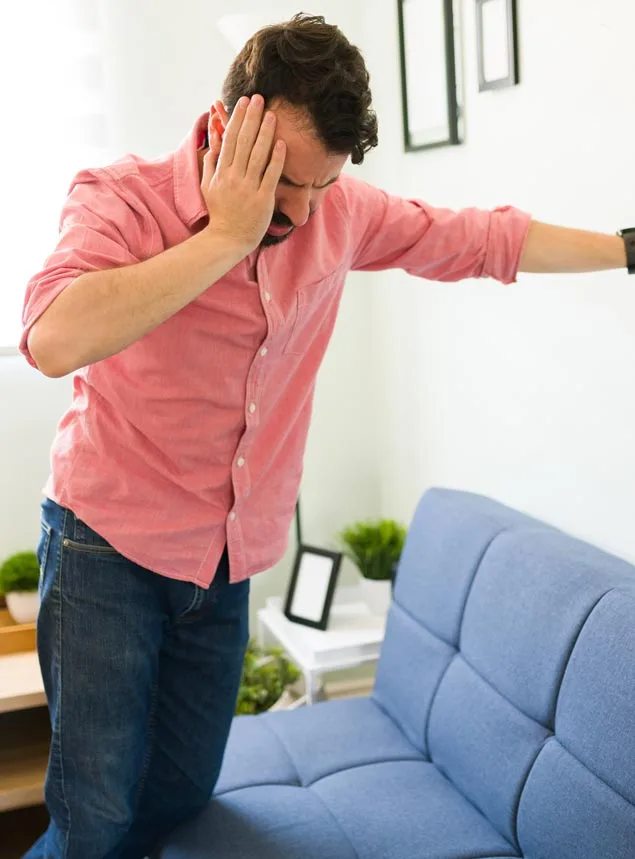Get Help for Benzo Addiction at Ingrained Recovery in GA
Prescription medications called benzodiazepines have their place when it comes to treating anxiety disorders and their related symptoms. However, overuse of these prescriptions can result in ‘benzo addiction,’ a condition of dependence that can cause serious problems over the long-term. And, unfortunately, the withdrawals from this class of drug are among the most dangerous, along with alcohol.
If you or a loved one needs benzodiazepine treatment in Georgia, look no further than Ingrained Recovery’s comprehensive programs.
Ingrained Recovery supports you at every stage of the process, from overcoming benzo withdrawal symptoms to long-term coping skills that help you maintain sobriety. Allow us to support you with our robust options and evidence-based approaches for benzodiazepine addiction.
Keep reading to learn more about our effective benzo treatment programs, and remember you can reach out to our enrollment staff at any time to learn more about our services!
Find the Right Addiction Treatment - Convenient to Georgia

Benzodiazepine Withdrawal Symptoms and Medical Detox
When you have struggled with benzodiazepine addiction for some time, you may find that you are quite uncomfortable in the early days without the prescription. Much like alcohol withdrawal, you may experience some intense symptoms when you decide to pursue treatment programs at Ingrained Recovery.
What can you expect from the first days of benzodiazepine withdrawal syndrome?
Here are some of the symptoms most people experience when removing the drug from their systems:
- Sleep disorders and disturbances
- Irritability, tension, and anxiety symptoms
- Panic attacks
- Tremors (mostly in the hands)
- Sweating
- Difficulty concentrating
- Nausea and vomiting
- Heart palpitations
- Headaches
- Muscle spasms and pain
If you have been struggling with benzodiazepine addiction for some time, you may also experience more severe symptoms such as psychosis or seizures. This is why it is beneficial to have 24/7 medical care when you first come off your prescription (or stop using illicit benzos as well).
How Long Does Post-Acute Withdrawal Syndrome Last?
With a list of uncomfortable symptoms like that, you may be wondering how long it will take before you break the physical dependence on benzos. The onset of some of these withdrawal symptoms is fairly early with anxiety symptoms returning around days one through four. This is often accompanied by a bout of insomnia as well.
Unfortunately, this is not the end of your withdrawal process and provides another reason why choosing medically supervised detox for benzodiazepines is almost always recommended.
You will hit your full-blown withdrawal symptoms roughly ten days to two weeks after your last dose. The exact timeline varies depending on the half-life of the specific benzo you have been taking.
A partial list of benzodiazepines, from short-acting to longer-acting, is as follows:
- Ativan (this benzo has a shorter half-life and duration in your body)
- Valium
- Librium
- Xanax
- Klonopin (the longest-acting benzodiazepine generally available)
Anxiety may peak after this period of acute withdrawal and be sustained long-term unless you seek other treatment for it. At Ingrained, support for alternatives to benzos for anxiety management is a core of our services, as we always seek to address the underlying causes that lead to use and abuse in the first place.
What are the Levels of Benzodiazepine Addiction Treatment in Georgia at Ingrained?
If you are worried about how you will handle these withdrawal symptoms, it is important to ensure that you have a supportive community of people who are cheering you on. Our benzo addiction treatment program helps you lay the groundwork for long-term success when you graduate.
Here are the various levels of service you can make use of at our upscale alternative to attending a treatment center in Atlanta.
Benzo Detox for Gradual Tapering
Because the side effects of benzodiazepine addiction can be quite problematic, there are times when gradual tapering is called for. This minimizes the serious side effects and may be extremely necessary for anyone who has been utilizing the drugs for some time. You should only taper your medication with the help of skilled medical professionals.
We may be able to offer you additional medication-assisted treatment to help with withdrawal symptoms. For example, we may be able to offer something for insomnia, nausea, and vomiting.
You will have access to around-the-clock care from our medical staff as well as licensed counselors who can help you start recovery from drug abuse in a supervised setting. Rest easy knowing that you have the help needed to stick with sobriety.

Inpatient Treatment Center for Intensive Care
Once you graduate from a medical detoxification process, you likely are not yet ready to return to your day-to-day life. The worst of your benzo withdrawal is over, but you likely do not have the skills (or support) you will require to cope with the stressors of daily life. After detox, our residential options are a great place to begin benzo addiction treatment in earnest.
Most people will stay in our addiction treatment center for thirty to ninety days. During this time, you will have access to a wide variety of evidence-based treatments according to your individualized treatment plans. From individual therapy to group therapy, we offer every level of support necessary to take you to the next level.
We even offer holistic therapies that take into account the mind and body such as yoga and art therapy sessions, as well as a robust equine therapy program.
Intensive Outpatient Program for Long-Lasting Support
Last but not least, you may move into an intensive outpatient program as the final stage in treating benzodiazepine addiction. This is a step down from partial hospitalization and gives you even more options to explore the local area.
You can spend just a few hours each week in this program with individual therapy, group therapy, and medication-assisted treatment.
This goal here is to help you move from a more intensive level of care to return to your daily life, routine, family, and friends. We offer scaled support with just a few hours of treatment, enabling you to enjoy the best that the Georgia area has to offer in your downtime.
We also maintain relationships with preferred PHP and IOP offerings throughout Georgia and the US, to better accomodate clients from across the state and country.
Partial Hospitalization Program to Transition Back
Eventually, you will need to leave our benzodiazepine addiction treatment center but this does not mean you are ready to lose all support. At Ingrained Recovery, our partial hospitalization program will help you scale your support to get to the right level of help with your drug addiction.
Our program allows you to spend most of your waking hours in our treatment center. This means that you can spend time with loved ones at night and sleep in your own bed, if desired, or at a conveniently located sober living facility.
It’s a great way to practice your new skills and start to make strides toward living without benzo abuse. You gain access to the same intensive treatment options as you would have during inpatient but have a new level of flexibility and opportunity in your off hours.
Find Effective Benzodiazepine Addiction Treatment in Georgia

Overcoming Benzo Addiction with Dual Diagnosis Treatment
Once you have gotten help to manage withdrawal symptoms, you may start to turn your attention to other forms of medication management. Especially if you have severe anxiety (which is often the reason for a prescription for the most commonly abused benzodiazepines), you may need more help from a skilled team to alleviate your concerns.
Ingrained Recovery offers dual diagnosis treatment so that you can get help for benzo addiction as well as any underlying conditions that contribute to your substance use. Benzo use is common with severe mental illness. It’s important to note that those who have a prescription are almost twice as likely to abuse it than someone who is not prescribed benzos.
As you likely have experienced, the symptoms of your mental health condition are likely to persist until you receive treatment for them. This could take the form of individual therapy sessions and group therapy where you learn coping skills or it could look like medication-assisted treatment with non-habit-forming prescriptions.
How to Cover the Cost of Benzodiazepine Addiction Treatment
One of the biggest hurdles for individuals who want to seek benzodiazepine addiction treatment is the upfront cost of service. There are lots of opportunities to cover the initial expense of receiving help at our treatment center at Ingrained Recovery.
Whether you have insurance or not, we can help you work out a plan to cover medical supervision, inpatient treatment, or intensive outpatient. Here is what you need to know about covering your treatment, therapy sessions, medication management, and even alternative therapies.
Getting Help with Insurance Plans
When you go through the treatment process, there are a lot of things you have to consider first. This often means you need to come up with a plan for how you are going to pay for both inpatient and even outpatient treatment. The good news is that Ingrained Recovery accepts a variety of private insurance options for benzo addiction.
Under the Affordable Care Act, mental health and substance use are required to be covered to the same degree as medical procedures. It is one of your essential health benefits, so you may want to make good use of your insurance. Allow us to verify your insurance benefits quickly and easily before you enroll in our safe and supportive environment.
While we are a luxury rehab facility, that does not mean that your insurance will not cover our services. They want to see you get the help you need and may cover treatment for up to 90 days in a residential treatment setting. You may have to pay a premium or copayment for your treatment though.
Allow us to answer your questions, talk about payment plans, and more with a quick (and completely confidential) phone call.
Paying for Your Benzo Addiction Treatment Program Without Insurance
It is important to note that you can still seek treatment for benzo addiction and other drugs without an insurance plan. Ingrained Recovery can assist by coming up with an affordable payment plan for those who will be covering the cost of treatment out-of-pocket. This minimizes the upfront cost and allows you to take advantage of services as soon as possible.
Many financing options also exist in the form of private loans to cover medical bills. We may also be able to offer you scholarships or grants to help cover the cost of treatment.
Keep in mind that your friends and family members are eager for you to get help for your addiction. You may be able to borrow money or do some fundraisers to get the help you need. This can also help to cover your out-of-pocket expenses, even with comprehensive private insurance plans.
Get Solutions and Find Help at Ingrained Recovery Now
Get Help for Benzo Abuse at Ingrained Recovery Today
If you are ready to start making progress on your benzo addiction, Ingrained Recovery is ready and waiting to help you take the first steps. Allow our warm and welcoming admissions staff to give you more information on our benzo addiction treatment program so that you can make an informed choice about what level of care is right for you.
With a quick and confidential phone call, we can verify your insurance benefits and help you work out the logistics of enrolling in medical detox and residential treatment today. Contact us now to learn more!
References
- Pétursson H. (1994). The benzodiazepine withdrawal syndrome. Addiction (Abingdon, England), 89(11), 1455–1459.
- Brunette, M. F., Noordsy, D. L., Xie, H., & Drake, R. E. (2003). Benzodiazepine use and abuse among patients with severe mental illness and co-occurring substance use disorders. Psychiatric services (Washington, D.C.), 54(10), 1395–1401.
- Mental health and substance abuse health coverage options. HealthCare.gov. (n.d.). https://www.healthcare.gov/coverage/mental-health-substance-abuse-coverage/

